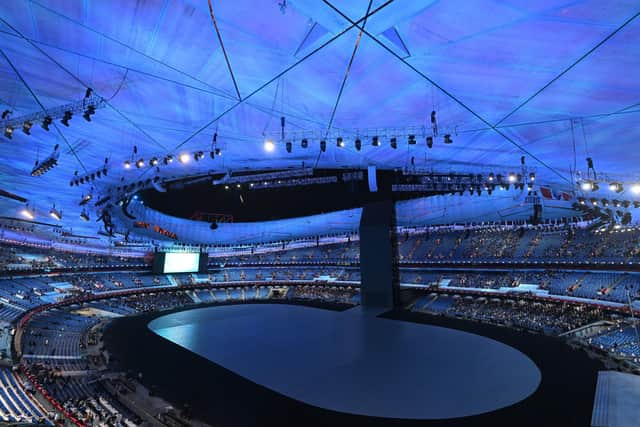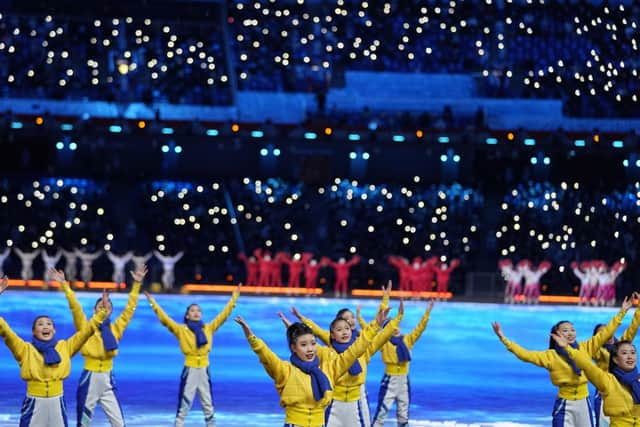Sportswashing of the Beijing Winter Olympics ignites a moral dilemma
Politics has a way of infiltrating every aspect of life, and sport – despite often being described as the best form of escapism – is no different.
Look no further than this year’s Qatar World Cup, a winning bid that has been shrouded in controversy and accusations of corruption from the moment it was announced.
Advertisement
Hide AdAdvertisement
Hide AdSportswashing is defined as the practice of an individual, group, corporation or nation-state using a major or prestigious international sport to improve its reputation, through hosting a major event, the purchase or sponsorship of sporting teams, or by participation in the sport itself.


Football’s World Cup is not the only global event this year that has been tarnished with these allegations: the Beijing Winter Olympics are no different.
A report in the Observer revealed that the Chinese government have employed an army of western social media influencers, each with hundreds of thousands of followers on TikTok, Instagram or Twitch, to spread positive stories about China throughout the Winter Olympics.
China and the Chinese government have been accused by human rights groups of detaining more than one million Uyghur Muslims in a large network of what the Chinese government rather ominously call re-education camps.
Advertisement
Hide AdAdvertisement
Hide AdYou only need a cursory look back through history to see just how long this has been going on.


The most famous example of this would be the Berlin Olympics of 1936. Nazi leader Adolf Hitler used the Olympics to try and make the rest of the world believe Germany under his rule wasn’t really such a bad place. As the eyes of the world rested on Berlin, there was a slight relaxation around the persecution of Jews and other ethnic minorities.Despite the clearly obvious signs of what Hitler was doing, most of the world’s leading nations still attended the Games and some even participated in a Nazi salute.
Any British athlete taking the 5,017-mile trip to Beijing this month will be doing so in a very different context but the question remains over whether we should really be going to the Games at all.
The allegations against the Chinese government are not to be taken lightly – the UK, US, Canada and the Netherlands have accused China of committing genocide.
Advertisement
Hide AdAdvertisement
Hide AdThere have been reports in the camps that China has been forcibly sterilising women in an attempt to suppress the population.


The UK Foreign Secretary Dominic Raab described the treatment of Uyghurs as “appalling violations of the most basic human rights”.
In 2018, a UN Human Rights Committee, said it had credible reports that China was holding up to a million people in counter-extremism centres.
This all make for extremely disturbing reading and by holding and attending the Games in China, is the world not in some way saying that these things are acceptable, when we all know they are not?
Advertisement
Hide AdAdvertisement
Hide AdLithuania, th United States, Australia, UK, Canada, Belgium, Denmark and Estonia have all announced some form of boycott of these Games.
Most of these are democratic boycotts, which just involve the countries not sending their diplomats – a measure that will hardly have the Chinese government quaking in their boots.
“The Biden administration will not send any diplomatic or official representation to the Beijing 2022 Winter Olympics and Paralympics,” a statement released by the administration on December 6 said.
The last time the United States staged a full boycott of an Olympic Games was the 1980 Summer Olympics in Moscow.
Advertisement
Hide AdAdvertisement
Hide AdThe then American President Jimmy Carter called a boycott after the Soviet Union’s invasion of Afghanistan the previous year.
The Soviets retaliated by boycotting the Los Angeles Games just four years later.
While we may not want a boycotting tit-for-tat to begin between the world’s leading sporting nations it is important that the world is seen to make a stand.
There are more important things at stake here.
Comment Guidelines
National World encourages reader discussion on our stories. User feedback, insights and back-and-forth exchanges add a rich layer of context to reporting. Please review our Community Guidelines before commenting.